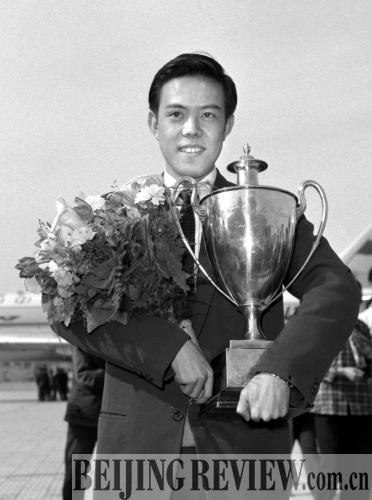|
A national system
To many insiders, the key for China to become a sports power is to maintain the whole nation system, concentrating the country's resources on training certain sport talent. This system guarantees that Chinese athletes will make great achievements in all kinds of international games, said Liu Peng, head of the GASC.
"China, as a developing country where sports are neither as deeply ingrained in the society nor is there a developed industry to support it, has to be good at concentrating limited resources and implementing effective management to be competitive in the international arena," said Liu.
 |
| UNFORGETABLE: Rong Guotuan wins gold during the men's singles competition of the 25th Table Tennis World Championship on April 5, 1959. Rong is China's first world sports champion (XINHUA) |
The government-controlled whole nation system of sports gives rise to the efficient production of athletes, who are chosen and sent to sports academies to be trained. The best are sent to local sports teams and then on to the national team to receive concentrated training. All this is managed and paid for by the state.
"I have never bought any equipment or shoes since I went into the sports school when I was 5," said world table tennis champion Zhang Yining, who has been freed by the system to focus on her skills.
Under the whole nation system, support for athletes also includes scientific research and technology. As early as 1956, China set up a 5,000-square-meter sports science research institute.
"It's a big systematic project to win gold medals. But without certain technological support the results achieved by some sports teams will certainly be affected," said Jiang Zhixue, head of the Science and Education Department of the GASC.
"When it comes to the whole nation system for competitive sports, it's about how we look at the value and function of the particular sport," said Liu, noting that great results not only meet people's entertainment needs, but also boost national morale and confidence.
On November 16, 1981, a live broadcast of the Chinese female volleyball team's victory in the country's first world championship in the "three big ball" games (football, basketball and volleyball) stirred the excitement of the whole nation.
"I think the whole nation system is the best option we have," said Chen Zhonghe, the chief coach who led the volleyball team to another world championship during the 2004 Olympic Games. He said the current system is the best, given the reality of the country's situation. Competitive sports, he said, have developed slowly among China's colleges and civil organizations. Top-tier athletes can only be trained through professional teams.
Since Chinese sports insiders first unveiled plans to achieve glory at the Olympic Games in the 1980s, many non-Olympic sports had been cut out. Even the "three big ball" games were affected—the national volleyball league was downsized, creating a smaller group of players from which the national team could choose.
"We felt the change strongly when we went for training or matches in foreign countries. In the United States, it was so easy for the national team to solicit hundreds of volleyball teams from various colleges, while we only had hundreds of professional players," said Chen.
China is in the process of getting rid of a single sports administration that trains players. In the last 10 years, the country's competitive sports have gone from a singular system to one of pluralism. There are increasing numbers of high-quality athletes being cultivated in sports industry associations, colleges, social sports clubs, enterprises and even by private benefactors. The investment into competitive sports has shifted from a single national input to multiple sources.
| 